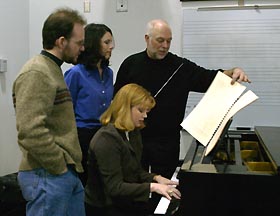|
This is an archived article.
For the latest news, go to the Advance
Homepage
For more archives, go to the Advance Archive/Search Page. |
||
|
Ph.D. Program In Music
Prepares 'Complete Musicians' By Sherry Fisher
"I'm thrilled," says Mann, who will finish her Ph.D. in May and start her new job in September. "UConn deserves a lot of credit for preparing me for this career," she says. "I've had an excellent education and tremendous pedagogical opportunities here." Mann is in the combined music theory and music history doctoral program.
She is one of many students in the doctoral program to secure a position in academia. "The employment rate of our Ph.D. students is 100 percent within a few months of graduation," says Richard Bass, director of graduate studies in music. "Many small to medium-sized universities look for faculty with the broad background our program offers." The combined degree in music history and theory was created about 10 years ago, out of necessity. "Our program is smaller than those of most other Ph.D.-granting institutions, so we put into place this unique concentration that combines music theory and music history into a single program," Bass says. "Therefore, in contrast to other research universities who produce large numbers of graduates with limited areas of specialization, we turn out smaller numbers of Ph.D.'s with a broad range of abilities and research interests." This not only allows the music department to carry out their mission with a small faculty - only three each in history and theory - it also gives students the teaching and research experience that makes them marketable. "It's the kind of training that really is able to translate into the academic world once we leave here," says Mann, who came to UConn after earning her undergraduate and master's degrees in piano performance, at the University of North Carolina and Louisiana State University. "When I came to UConn, I was initially interested in theory, but thought it would be great to have a background in history as well," she says. After taking several courses, she realized her "true calling" was in music history, and that became her focus. Mann says the program offered her a lot of individual attention, "incredible teaching experiences," and opportunities to pursue scholarly endeavors. The Doctor of Musical Arts (DMA) program in performance, which was instituted about the same time as the revised Ph.D., also has a strong academic component, Bass says. "Scholars and performers in the department benefit from each other's perspectives." Students in the DMA program are required to select a minor, either in music history or music theory. They are often in the same classes as the Ph.D. students. James Chesebrough, a student in the DMA program, is studying conducting. He decided to take theory as a minor. "As a conductor, I think that theory is the area that I should use to support my work," he says, "because theory becomes a tool that you use in analysis in interpreting whatever the composer has intended." Chesebrough taught music in New Hampshire public schools for more than 20 years before coming to UConn. He says his work in theory aligns directly with his conducting of bands at UConn. An article he wrote for a theory course will soon be published in the Journal of Band Research. According to Bass, graduate students in both the DMA program and the music theory and history program work together. "Some institutions don't even mix the two," he says. "Others mix them, but there's a clear division. We try to de-emphasize the division between performers and the scholars, so that we end up with a 'complete musician'." Students in both programs have had a high success rate in getting their work published or accepted for conference presentations. In all cases, teaching is emphasized, Bass says. Stuart Woronecki, a graduate student in music theory and history says he enjoys the accessibility and support of the faculty. "If you want to discuss something, they're always available," Woronecki says. "Class sizes are fairly small and we get to work with faculty very closely." Faculty members teaching in the Ph.D. program try to build on the experiences and interests of the students. Students come to us with a set of experiences, Bass says. "They've already earned degrees from other institutions, have performance backgrounds, have taught, or have some combination thereof. They're fairly mature. We try to capitalize on who they are. We say, 'Who are you and how can we help you pursue your own interests?'" |
 elissa Mann just heard the
good news. She's been hired in a tenure-track position as
assistant professor of musicology at the University of Southern
Maine.
elissa Mann just heard the
good news. She's been hired in a tenure-track position as
assistant professor of musicology at the University of Southern
Maine.
